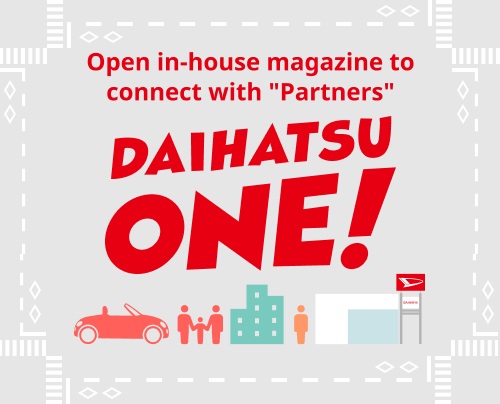- Company
- Management Policy & Strategy
- Service
- NEWJul. 21, 2021
Suzuki and Daihatsu Join Commercial Japan Partnership for Dissemination of CASE Technologies in Mini-commercial Vehicles
Jul. 21, 2021
Suzuki Motor Corporation
Daihatsu Motor Co., Ltd.
Toyota Motor Corporation
Tokyo, Japan, July 21, 2021—Suzuki Motor Corporation (Suzuki) and Daihatsu Motor Co., Ltd. (Daihatsu) announced that they joined the Commercial Japan Partnership (CJP) commercial vehicle project today to accelerate their carbon neutrality initiatives in minivehicles through the dissemination of CASE technologies and services. As part of their participation in the project, Suzuki and Daihatsu are to each acquire 10 percent of issued shares of Commercial Japan Partnership Technologies, the joint venture for the CJP initiative, from Toyota Motor Corporation (Toyota).
Minivehicles, in which Suzuki and Daihatsu excel, account for about 31 million of the approximately 78 million vehicles owned in Japan and serve as an essential lifeline in the daily lives of people, especially in rural areas. Also, mini-commercial vehicles cover areas that are accessible to them because of their size and support last-mile logistics. Although minivehicles can play important roles in the realization of a carbon-neutral society and the spread of CASE technologies and services, in this era of profound transformation, there are many issues that minivehicle manufacturers are unable to solve on their own.
CJP was launched in April this year to accelerate societal implementation and dissemination of CASE technologies and services by combining the commercial business foundations cultivated by Isuzu Motors Limited (Isuzu) and Hino Motors Limited (Hino) with the CASE technologies of Toyota while helping address various challenges facing the transportation industry as well as contribute to the achievement of a carbon-neutral society.
Expanding CJP to include minivehicles with the participation of Suzuki and Daihatsu will enable the promotion of improved integrated logistics efficiency spanning from large trucks to mini-commercial vehicles. This new collaboration also aims to disseminate affordable advanced safety technologies and electrification for minivehicles via the leveraging of Suzuki and Daihatsu’s strength of high-quality, low-cost manufacturing and Toyota’s CASE technologies.
Main Aims of CJP Collaboration
1) Improving logistics efficiency by building a connected-technology infrastructure that links the main arteries of logistics (truck logistics) with the capillaries of logistics (mini-commercial vehicles)
2) Expanding from commercial vehicles to minivehicles the use of advanced safety technologies that contribute to safety and security
3) Cooperating on the use of technologies for the electrification of affordable, high-quality minivehicles that can be sustainably disseminated
To fulfill the automotive industry’s mission of “improving people’s lives” and “leaving a better Japan and a better planet for the next generation”, the companies participating in CJP intend to continue to deepen areas of collaboration and openly consider coordination with other like-minded partners.
Outline of Commercial Japan Partnership Technologies (at the end of July 2021)
| Name | Commercial Japan Partnership Technologies Corporation |
|---|---|
| Location | 1-4-18 Koraku, Bunkyo-ku, Tokyo |
| Capitalization | 10 million yen (Capital structure: Toyota 60 percent, Isuzu 10 percent, Hino 10 percent, Suzuki 10 percent, Daihatsu 10 percent) |
| Representative director | Hiroki Nakajima, president (President of Toyota Motor Corporation’s in-house CV Company) |
| Start of operations | April 1, 2021 |
| Principal line
of business
|
Planning CASE technologies and services for commercial vehicles |
Video:
Joint Press Conference by Suzuki Motor Corporation, Daihatsu Motor Co., Ltd. and Toyota Motor Corporation
Suzuki Motor Corporation, Daihatsu Motor Co., Ltd. and Toyota Motor Corporation held a joint press conference in Tokyo on July 21, 2021, at 15:30 JST. Video from the press conference is available below.
Toyota President Akio Toyoda Remarks
Hello everyone. I would like to share with you my thoughts on this partnership.
“We want to help improve people’s lives.”
“We want to help leave a better Japan and a better planet for the next generation.”
This is the mission of the automotive industry and the origin of the founding of the three companies present here today.
The commercial business partnership announced in March by Isuzu, Hino, and Toyota was prompted by the same idea.
Initiatives are now underway for easing the work situations of troubled colleagues on the front lines of transportation and for protecting the prosperous lifestyles that transportation supports.
With Suzuki and Daihatsu now joining us in this project, we will take on the challenge of improving the lives of people supported by minivehicles.
Of the 78 million cars owned in Japan, 31 million are minivehicles.
In many rural areas, minivehicles account for more than 50 percent of owned vehicles.
In Japan, 85 percent of roads are so narrow that they can only be used smoothly by minivehicles
Roads make cars. Minivehicles are collectively the “people’s car” made by the roads of Japan.
And they are a practical and sustainable lifeline of Japan that has continued to evolve along with people’s lives.
However, great challenges now lay ahead of us. The CASE revolution and the necessity to achieve carbon neutrality are now forcing the world of minivehicles to undergo a profound transformation.
I believe that no matter how much the times change, we must not abandon either minivehicles or our customers.
Suzuki President Toshihiro Suzuki Remarks
Hello everyone.
While watching the Toyota, Hino, and Isuzu press briefing to announce the CJP project in March this year, I realized that we could enrich society even more by not only connecting the distribution bases of large trucks but also connecting those distribution bases to customers’ homes.
Speaking at a meeting of Suzuki’s sales bases in early April, I shared my thoughts that, to achieve this, mini-commercial vehicles, which account for 58 percent of all commercial vehicles, also need to participate in the project, and, by doing so, we could contribute more to the world.
Since minivehicle standards were established in 1949, minivehicles have been used for a variety of purposes, such as in local transportation, in agriculture, forestry & fisheries, as well as in construction, retail, and logistics, to enrich people’s lives by being close to them, including in their work.
In Japan, every industry is now endeavoring to achieve carbon neutrality, and the world of minivehicles is no exception.
Our mission is to bring to market minivehicles that are affordable and contribute to carbon neutrality and to continue to be an indispensable part of our customers’ lives. However, accomplishing this mission on our own would be very difficult. The whole of society must work toward the same goal to achieve it.
Daihatsu felt the same way, and we had been discussing what we could do together. During such, Toyota approached us and invited us to work together to maintain Japan’s lifelines. Because the philosophy and purpose of CJP resonated with us, we decided to join the project.
When Toyota proposed that Daihatsu and Suzuki join CJP, I was very happy to learn that President Toyoda was thinking the same as I was.
Our company’s senior advisor, Osamu Suzuki, described minivehicles as “works of art” created under various restrictions such as those related to size, engine displacement, and above all, an affordable price.
We want to evolve minivehicles, which are collectively the “people’s car” and lifeline, in stride with the changing times and to pass on to the future the baton of the “works of art” created by our predecessors as tools to enrich the lives of our customers. That is our mission and hope.
As like-minded colleagues, we would like to start by working together as five companies.
Thank you very much.
Daihatsu President Soichiro Okudaira Remarks
Hello everyone. I would like to talk about the background and details of this partnership.
As President Toyoda mentioned, there are 31 million minivehicles under ownership in Japan, which is about 40 percent of all owned vehicles in the market, with 8 million of them being mini-commercial vehicles.
The number of in-use minivehicles is steadily increasing, and there is a strong demand for mini-commercial vehicles not only among fleet customers but also among individual customers.
With such a large number of customers using minivehicles, we minivehicle manufacturers believe that it is our responsibility to make people’s lives safer, more secure, and more prosperous by promoting carbon neutrality and by achieving the dissemination of CASE technologies and services for minivehicles.
Meanwhile, we have been offering customers affordable fuel-efficient technologies and advanced safety technologies by thoroughly pursuing low-cost manufacturing by way of simple factories, simple design elements, and slim fixed costs.
Also, our internal research shows that the current CO2 emissions of minivehicles from a life cycle assessment perspective are about 30 percent lower than non-minivehicle compact cars and comparable to those of small hybrid electric vehicles.
Our understanding is that it is no easy task to disseminate CASE technologies and services and to reduce CO2 emissions beyond the current level while keeping prices affordable. We have truly entered a once-in-a-century era of profound transformation.
It is extremely difficult to independently address these issues, and that necessitates a collaborative effort that goes beyond conventional frameworks.
Therefore, President Suzuki and I had been discussing for some time whether there were areas in which we could work together for the sake of our customers. We were then approached by President Toyoda, leading to what we are announcing today.
I am convinced that adding Toyota’s CASE technologies to Isuzu and Hino, which are commercial vehicle professionals, and that participation in this project by Suzuki and Daihatsu, which have dedicated themselves to minivehicles, will create significant synergies. These include an integrated commercial vehicle infrastructure that covers, figuratively speaking, “from the main arteries to the capillaries”, as well as the realization of electrification suitable for minivehicles through the fusion of advanced technologies and low-cost manufacturing.
I would like to explain the specific details of our participation in this partnership, including what we will consider going forward.
The first point is related to connected technologies.
Japan has about 60,000 logistics companies, roughly 70 percent of which are small-scale companies with fewer than 20 employees or one-person operations, and there is still a long way to go for automakers to meet the needs of individual customers. Through this partnership, we would like to seek frontline customer feedback that has thus far escaped us. And we would like to build an infrastructure that connects various elements, including data, of trucks to mini-commercial vehicles, which are responsible for the last mile, to improve the efficiency of logistics as a whole.
The second point has to do with advanced safety technology, such as advanced driver-assistance systems that protect our customers.
We will bring together the technologies and know-how of each company and study the development of advanced safety technologies that are more affordable with a view toward future development.
The third point concerns the electrification of minivehicles, including mini-commercial vehicles.
Toward achieving carbon neutrality, we will take on the challenge of developing affordable electrified minivehicles through technological cooperation on electric components and by consolidating development resources.
By collaborating on the three points, we will aim to include minivehicles in the societal implementation of CASE technologies and services. We, too, will put into practice President Toyoda’s “Give it a try” thinking.
As of today, Suzuki and Daihatsu are now members of the Commercial Japan Partnership, a commercial vehicle project by Isuzu, Hino, and Toyota, and we will begin our efforts with commercial vehicles as the starting point. To promote collaboration, Suzuki and Daihatsu will each acquire 10 percent of Commercial Japan Partnership Technologies, which is the joint venture for the project, through a share transfer.
As a manufacturer of minivehicles, Daihatsu will continue to provide products and services while insisting on products that are compact, light, and low-cost so that minivehicles, which serve as a lifeline, will remain affordable and accessible to our customers.
Through this partnership, we will accelerate such efforts.
Thank you very much.
END




